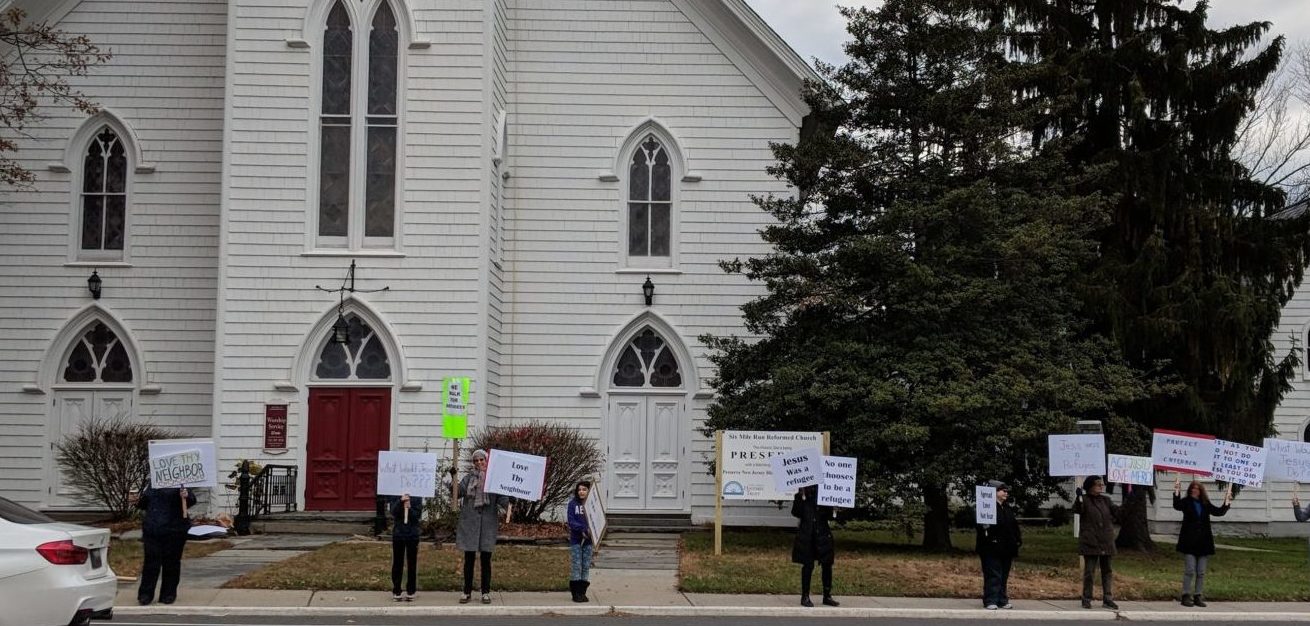For Six Mile Run Reformed Church, asking questions about putting faith into action led to a unique set of answers.
Like many churches, “faithful action” is a high priority for the Franklin Park, New Jersey, church. Together, the congregation began to wonder how they might live out their faith in the local community, the region, and even the country.
To find some answers to their questions, a team of a dozen members met in early 2018. The team wanted to identify ways to assist the congregation in finding fresh ways to express its faith through faithful action. The group sent out a survey to the congregation to determine which justice areas they were interested in learning more about. Topics like immigrants and refugees, gun violence, mass incarceration, peacemaking, environmental stewardship, and drone warfare rose to the top of the list. List in hand, the small coalition of church members became the Peace and Justice Committee and began researching the topics. They chose to share their research through presentations during the fellowship hour after Sunday worship.
Earl James, a member of Six Mile Run and coordinator for Advocacy at the Reformed Church in America, says the committee’s approach is unique. He hasn’t seen other churches put on “lunch-and-learns” that cover such a variety of topics and end with opportunities for people to take action individually and collectively.
“And we have no professionals on the Peace and Justice Committee who are providing leadership for any of this. We are learning as we go,” he says.
The committee has been learning-and-going for a few months now, covering a handful of the topics so far. About quarterly, a subcommittee of the Peace and Justice Committee takes up a particular issue and researches it, finds speakers, handouts, and resources to present. Food, small group discussion, and large group “report-outs” are usually part of the programming, as well as broader engagement around the topic in the life of the church.
“For each of the fellowship hours where we’re presenting these topics, we try to coordinate with whoever’s bringing the message [that day] so that their sermons incorporate that topic and bring Scripture in,” says Laura Waddell, a member of the Peace and Justice Committee. “So when we did the topic on immigrants and refugees, we incorporated Scriptures around that. The sermon was around remembering that Jesus himself was a refugee.”
Scriptural engagement has been a priority for the Peace and Justice Committee. Situating their desire for justice and faithful action within a biblical framework has allowed its members to stay engaged in conversation and fellowship without threat of looming political division.
“In every one of these things we talk about ‘What does the Bible say about this topic?’ and ‘How do we stand against standards that are in the Bible?’” says James. “We’re very much aware that there are people all over the map on these issues from a political persuasion. But we say we’re a church family, and we should not be that concerned about politics. Because we’re a church, what does the Bible say about these things? And how do we explore this together?”
As the congregation explores these topics during fellowship hour, the intention of the Peace and Justice Committee is to present to the congregation both information and opportunities for action. The committee has been surprised by the responses, ranging from church members creating protest signs to organizing a youth workshop to starting a community garden.
“This past April we finished an environmental stewardship topic,” says Waddell. “What I found to be amazing is that the change has been spreading through the church. The hospitality [committee] has changed what they’re using to serve during fellowship hour as part of their stewardship responsibilities. They’re using plates made of bamboo and compostable silverware made from corn. And our building and grounds committee has taken a look to see how we could conserve energy, and whether we can change our various providers to use clean energy.”
Momentum is growing as initiatives for faithful action spread throughout the church. And while presentations around peace and justice prioritize information, it’s about more than just facts and figures.
“I have a bias, and my bias is that people are not moved by information,” says James. “Somehow we have to get into each other’s stories, and we have to start talking with each other. It’s not about the best information and who’s the best giver of information. It’s about what are our own things that are close to us, and how can we promote people to take some steps to talking with each other about it? We’re going to change if we look at each other and we start moving places together.”
Natalia Connelly
Natalia Connelly is a student at Western Theological Seminary and a chaplain resident at Pine Rest Christian Mental Health Services in Grand Rapids, Michigan.



